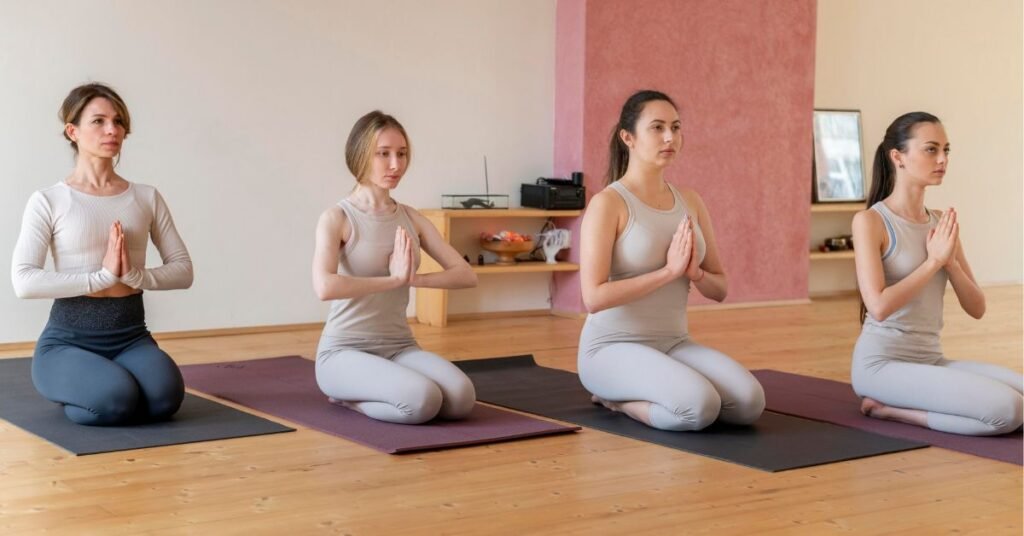Introduction
In today’s fast-paced world, stress, anxiety, and depression have become all too common. Many people turn to medication or therapy for relief, but did you know that yoga can be a powerful tool for mental health and well-being? Yoga is more than just physical exercise—it’s a holistic practice that nurtures the mind, body, and soul.
In this blog post, we’ll explore how yoga benefits mental health, what types are best for mental well-being, and why yoga is good for your brain. Whether new to yoga or looking to deepen your practice, this guide will help you understand how yoga can bring peace, clarity, and happiness into your life.
What Yoga Is Best for Mental Health?
Not all yoga styles are the same. Some are fast-paced and physically demanding, while others focus more on relaxation and mindfulness. If your goal is to improve mental health, certain types of yoga are particularly effective.
1. Hatha Yoga
Hatha yoga is a gentle and slow-paced style that focuses on breathing and simple poses. It’s perfect for beginners and helps calm the mind while reducing stress.
2. Yin Yoga
Yin yoga involves holding poses for longer periods, allowing deep relaxation and release of tension. It’s great for reducing anxiety and improving emotional resilience.
3. Restorative Yoga
This form of yoga uses props like blankets and bolsters to fully support the body, allowing complete relaxation. It’s ideal for those dealing with chronic stress or trauma.
4. Vinyasa Yoga
If you prefer a more active form of yoga, Vinyasa (also called flow yoga) synchronizes movement with breath, helping to release built-up stress and improve mood.
5. Kundalini Yoga
Kundalini yoga combines physical movement, breathing exercises, and meditation. It’s known for its ability to clear the mind and elevate emotional well-being.
Each of these styles has unique benefits, so choose the one that feels best for you!
Readmore: Yoga for Better Sleep Simple Pose
Readmore: Yoga for Emotional Balance
The Mental Health Benefits of Yoga
Practicing yoga regularly can have a profound impact on your mental well-being. Here are some of the key benefits:
1. Reduces Stress and Anxiety
Yoga helps regulate cortisol levels (the stress hormone), making you feel calmer and more relaxed. Controlled breathing and mindfulness techniques in yoga reduce anxiety symptoms and promote a sense of peace.
2. Boosts Mood and Reduces Depression
Studies show that yoga increases the production of serotonin (the “happy hormone”), which can help alleviate symptoms of depression. Poses like the Warrior Pose and Child’s Pose help open the body and release emotional tension.
3. Improves Sleep Quality
If you struggle with insomnia, yoga can help. Gentle yoga before bedtime relaxes the nervous system, making it easier to fall and stay asleep.
4. Enhances Focus and Mental Clarity
Yoga teaches you to be present, which improves concentration and cognitive function. This makes it easier to focus on daily tasks and feel more in control of your thoughts.
5. Encourages Emotional Healing
Yoga creates a safe space for self-reflection, allowing you to process emotions and heal from past experiences. The combination of movement, breathwork, and meditation supports emotional balance and resilience.
Readmore: How Yoga Helps with Anxiety
Readmore: How Yoga Can Help Improve Your Posture
Why Yoga Is Good for Your Brain
You might be wondering, “How does yoga actually affect my brain?” Here’s the science behind it:
1. Increases Gray Matter
Research shows that yoga practitioners have more gray matter in their brains. This means better memory, emotional regulation, and decision-making skills.
2. Balances the Nervous System
Yoga activates the parasympathetic nervous system (the “rest and digest” mode), helping you feel more relaxed and less reactive to stress.
3. Releases Endorphins
Endorphins are natural mood boosters. Yoga helps release these feel-good chemicals, reducing symptoms of anxiety and depression.
4. Reduces Inflammation
Chronic stress can cause inflammation in the brain, leading to mental health issues. Yoga lowers inflammation levels, promoting overall brain health.
5. Strengthens the Mind-Body Connection
By practicing mindfulness during yoga, you become more aware of your thoughts and emotions. This helps you manage stress better and respond to life’s challenges with more ease.
Tips to Get Started with Yoga for Mental Health
If you’re ready to experience the mental health benefits of yoga, here are some tips to get started:
- Start small – Even 10 minutes of yoga a day can make a difference.
- Find a style that works for you – Experiment with different types of yoga to see what feels best.
- Practice deep breathing – Breathing exercises (pranayama) help calm the nervous system and reduce stress.
- Be consistent – The benefits of yoga build over time, so try to practice regularly.
- Use guided videos or classes – If you’re new to yoga, online classes or in-person sessions can be helpful.
- Be kind to yourself – Yoga is a journey, not a race. Go at your own pace and enjoy the process.
FAQs
Q1. Can yoga completely cure mental health disorders?
Yoga can be a powerful tool for improving mental health, but it is not a substitute for professional medical treatment. It works best when combined with other therapies.
Q2. How often should I practice yoga for mental health benefits?
Practicing yoga 3-5 times a week can provide significant mental health benefits. Even short daily sessions can make a difference.
Q3. Can beginners do yoga for mental health?
Absolutely! Many styles of yoga, like Hatha and Restorative yoga, are beginner-friendly and perfect for mental well-being.
Q4. Is meditation necessary for yoga to benefit mental health?
While meditation enhances the mental benefits of yoga, it’s not required. Even focusing on your breath and being mindful during poses can help.
Q5. Can yoga help with panic attacks?
Yes, yoga’s breathing techniques and mindfulness practices can help manage panic attacks and reduce their frequency over time.
Conclusion
Readmore: 7 Yoga Poses to Boost Self-Confidence & Power
Readmore: How Yoga Boosts Immunity
Yoga is a powerful tool for improving mental health and overall well-being. Whether you’re looking to reduce stress, improve focus, or boost your mood, yoga offers a natural and effective way to achieve balance in your life. By incorporating yoga into your routine, you can strengthen your mind, nurture your emotional well-being, and create a healthier, happier you.
So, why not roll out your yoga mat and give it a try? Your mind will thank you for it!

Sonu is a passionate yoga teacher with over 6+ years of experience helping individuals find balance, strength, and inner peace through the transformative power of yoga. As the creator of Pure Yoga Vibes, Sonu shares expert insights, inspiring practices, and a wealth of knowledge to support your wellness journey. Dedicated to creating a space for growth and mindfulness, Sonu’s mission is to make yoga accessible and enjoyable for everyone. For inquiries or collaborations, feel free to reach out at contact@pureyogavibes.com.



